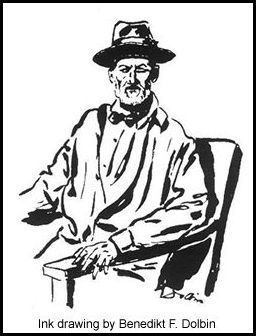
This page is for essays, notes, half-baked thoughts, reveries, and other
musings inspired by the great composer, Charles E. Ives.
Perfectly Sensible Pandemonium
Here's one of the many things that astounds me about Ives' music: The way that he constructs his music reflects his philosophical and religious preoccupations.
Consider this: Jan Swafford has asserted that, at heart, Ives is a religious
composer. And I agree with him. But Ives is not religious in the conventional
 sense.
Outside of early works like "The Celestial Country,” Ives' compositions
usually ask more questions than they answer. Rather than presenting a
unified, rational view of the world, rather than simplifying our experience,
Ives’ music usually portrays the world as fragmentary, disjointed, and--most
of all--incomplete. My favorite descriptive word for this sense in Ives'
music is kaleidoscopic. His music reveals the underlying, complex,
chaotic, and fragmentary reality that's all around us. We typically ignore
this dissonant reality by sticking to well-worn paths, whether they are
well-worn musical conventions or well-worn ways of thinking.
sense.
Outside of early works like "The Celestial Country,” Ives' compositions
usually ask more questions than they answer. Rather than presenting a
unified, rational view of the world, rather than simplifying our experience,
Ives’ music usually portrays the world as fragmentary, disjointed, and--most
of all--incomplete. My favorite descriptive word for this sense in Ives'
music is kaleidoscopic. His music reveals the underlying, complex,
chaotic, and fragmentary reality that's all around us. We typically ignore
this dissonant reality by sticking to well-worn paths, whether they are
well-worn musical conventions or well-worn ways of thinking.
So, Ives’ music represents a fragmentary and chaotic reality. There’s nothing new there. That's modernism in a nutshell. But, unlike modernists who lament the breakdown of sense and order, Ives relishes chaos; he dives right in and swims around, gleeful. Think of “The Fourth of July.” Think of “Putnam’s Camp.” The kaleidoscope, a child’s toy, is an apt metaphor because Ives takes child-like delight in the ever-shifting sound fragments and colors that his musical kaleidoscope provides.
Now for an even greater paradox: While Ives was attuned to the fragmentary, mutable nature of reality, he was also preoccupied with the idea of unity, oneness, and transcendence. In composition after composition, he returns to the hymn "Nearer My God to Thee." (The psychologist and philosopher William James explained these different ways of thinking about the world as preoccupations with “The One” or with “The Many,” monism or pluralism. He said that most people come down clearly on one side or the other. Ives’ music is all about both.) So then the question that Ives' art must answer becomes, "In the midst of this immense mass of sensory experience, this teeming stew of reality, how can I find--or even just glimpse--the Oneness that seems to be still more real?" Or, to put it in the simple language of the hymns that are woven through his works, "How can I draw closer to God?"
Unlike conventionally religious composers, Ives’ greatest works offer no ready answers. There is only a sense of continual struggle, striving to make sense of things, to see what's just around the corner--even if it can only be seen with a sidelong glance after a long, tough slog. (Consider the final movement of the Fourth Symphony, where this sense of a never-ending quest for the divine is most perfectly realized.) You might more accurately describe Ives as a "spiritual" composer, rather than a "religious" one. His music is always looking, always striving; it rarely arrives. This on-the-move aspect also lends the music some of its heroic qualities. (Think of “Emerson” from the Concord Sonata or the third movement from the Second Orchestral Set.) And Ives’ music is never dogmatic or orthodox, regardless of the fact that he spent most of his life attending mainstream Christian churches.
Ives' music is not tidy. It can't be contained by normal musical forms because these structures do not accurately represent the way that Ives perceives the world. (This is one of the reasons why Ives constantly tinkers with traditional forms: adding or removing movements from the four-movement symphony; creating "sets" from pieces that defy any conventional structure; recycling music again and again from a one work to another.) Ives’s music acknowledges that our perceptions of the world--and the understanding that we construct from those perceptions--are in a constant state of flux. It is never-ending process. Therefore, from Ives’ point of view, creating a work of art and presenting it as complete is disingenuous.
Ironically, this "unfinished" quality, which is often taken to be a sign of Ives' primitivism, represents exactly the opposite. Taken as a whole, his works are incredibly coherent and focused and well-thought-out on a philosophical, religious, and psychological level. But of course, Ives' musical "order" is not the order that you typically find in traditional Western classical music. I think that it's this aspect of Ives’ work that most points to composers like John Cage or Charles Mingus, and the whole idea of jazz, as well as other forms of "process music."
These are some of the ways that I like to think about Ives' music.
Scott Mortensen (May 4, 2005)
Original text copyright © Scott Mortensen 2005
This site is hosted by

Home | Reviews
| Composers
| Announcements
| Seen &
Heard | Societies